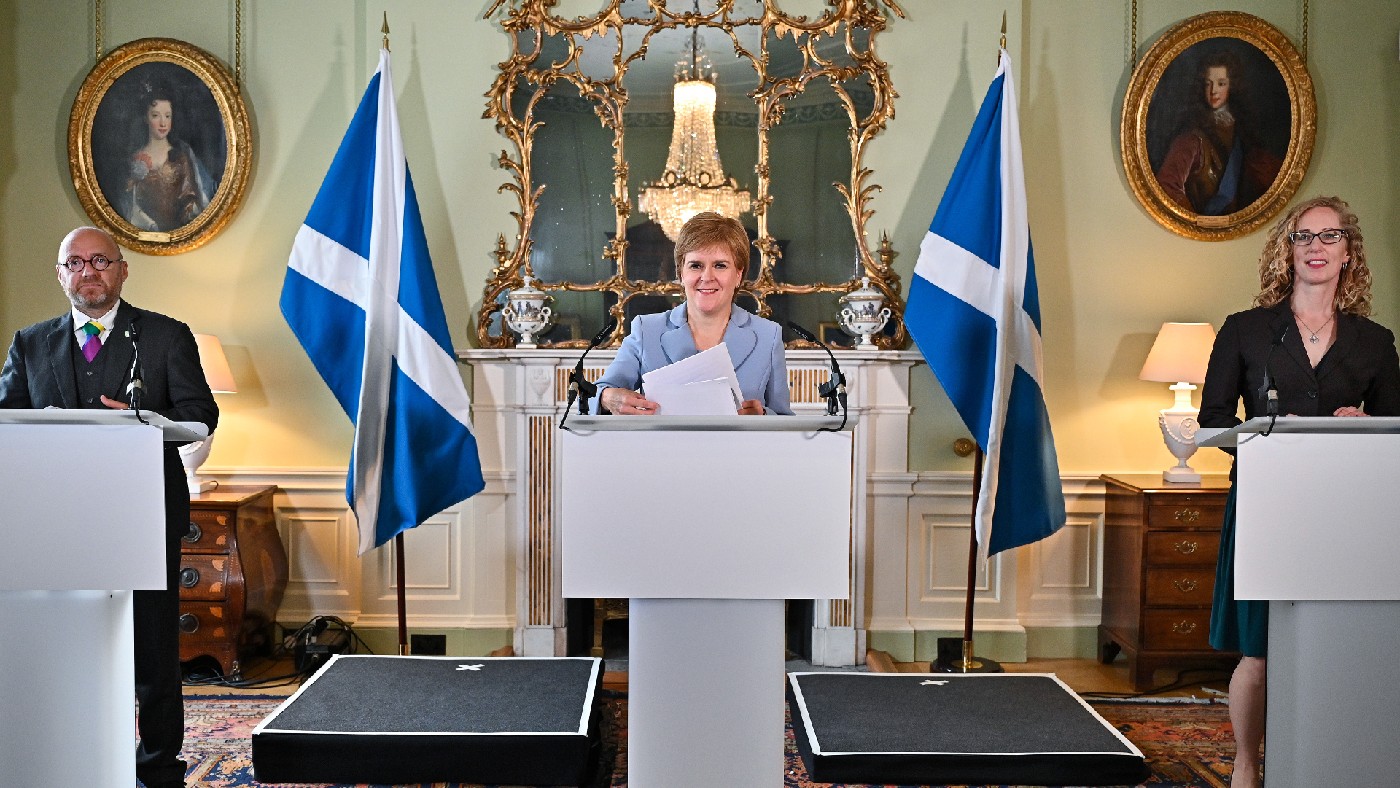The Scottish National Party and the Greens: a ‘joyous’ union?
This ‘cynical alliance’ has only one aim, says the New Statesman: bolstering Nicola Sturgeon’s case for a second referendum

A free daily email with the biggest news stories of the day – and the best features from TheWeek.com
You are now subscribed
Your newsletter sign-up was successful
“When is a coalition not a coalition?” When it’s called a “Co-operation Agreement”. That, said Chris Deerin in the New Statesman, is the name for the newly-minted deal between the SNP and the Scottish Greens, by which the two pro-independence parties will “jointly run Scotland for the next five years”.
Nicola Sturgeon’s SNP gets a built-in majority for its legislation in Holyrood – for which it was previously “one MSP short” – but still retains nearly all the power. The Greens are given two ministerial roles, and the profile of their party and its co-leaders Patrick Harvie and Lorna Slater will be raised.
The Scottish Greens are “by far the most left-wing party ever to have held power in the UK”: their manifesto for May’s Scottish elections displayed an “open hostility to business and the private sector”, and a “student politics” approach to tax. The new 50-page “Bute House Agreement” tries unconvincingly to reconcile “Green puritanism with Nat pragmatism”.
The Week
Escape your echo chamber. Get the facts behind the news, plus analysis from multiple perspectives.

Sign up for The Week's Free Newsletters
From our morning news briefing to a weekly Good News Newsletter, get the best of The Week delivered directly to your inbox.
From our morning news briefing to a weekly Good News Newsletter, get the best of The Week delivered directly to your inbox.
But ultimately, this “cynical alliance” has only one aim: Sturgeon wants a second referendum, and she thinks that having another nationalist party in government bolsters the case for holding one.
Still, you’d have to agree that it’s a “political masterstroke” on Sturgeon’s part, said Stephen Daisley in The Spectator. “Folding the Greens into her government takes an entire opposition party out of the picture, gives the SNP a partner in crime with whom the blame for failings can be shared, and silences the potential for criticism from the pro-independence left.” Just look back to the Cameron-Clegg coalition to see how they work: “the dominant party gets stability and the junior partner gets the flak”.
Don’t underestimate the Greens, said Gerry Hassan in The National. They are the fourth most-popular party in Scotland, with eight seats at Holyrood. They have already gained many concessions from the SNP in return for their support at crucial votes. Yes, they take a hard line on the climate and “the self-destructive nature of capitalism”, but so do many voters. This agreement merely formalises the important role that the Greens already have.
I have one small question about this “joyous new union”, said Euan McColm in The Scotsman: “What point does it serve?” The SNP could rely on support from the Greens in Holyrood anyway, before this “heavily caveated” deal. There are some pretty big chasms between the two parties, not least that the nationalists are in favour of economic growth and the Greens are against it. This pact is “pointless and risky” for them both. Opposition parties should be “delighted”.
A free daily email with the biggest news stories of the day – and the best features from TheWeek.com
-
 The environmental cost of GLP-1s
The environmental cost of GLP-1sThe explainer Producing the drugs is a dirty process
-
 Greenland’s capital becomes ground zero for the country’s diplomatic straits
Greenland’s capital becomes ground zero for the country’s diplomatic straitsIN THE SPOTLIGHT A flurry of new consular activity in Nuuk shows how important Greenland has become to Europeans’ anxiety about American imperialism
-
 ‘This is something that happens all too often’
‘This is something that happens all too often’Instant Opinion Opinion, comment and editorials of the day
-
 How corrupt is the UK?
How corrupt is the UK?The Explainer Decline in standards ‘risks becoming a defining feature of our political culture’ as Britain falls to lowest ever score on global index
-
 Democrats push for ICE accountability
Democrats push for ICE accountabilityFeature U.S. citizens shot and violently detained by immigration agents testify at Capitol Hill hearing
-
 Fulton County: A dress rehearsal for election theft?
Fulton County: A dress rehearsal for election theft?Feature Director of National Intelligence Tulsi Gabbard is Trump's de facto ‘voter fraud’ czar
-
 ‘Melania’: A film about nothing
‘Melania’: A film about nothingFeature Not telling all
-
 Greenland: The lasting damage of Trump’s tantrum
Greenland: The lasting damage of Trump’s tantrumFeature His desire for Greenland has seemingly faded away
-
 Minneapolis: The power of a boy’s photo
Minneapolis: The power of a boy’s photoFeature An image of Liam Conejo Ramos being detained lit up social media
-
 The price of forgiveness
The price of forgivenessFeature Trump’s unprecedented use of pardons has turned clemency into a big business.
-
 Reforming the House of Lords
Reforming the House of LordsThe Explainer Keir Starmer’s government regards reform of the House of Lords as ‘long overdue and essential’